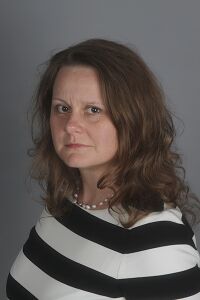Sandra Hoferichter – Keynote 01 2024
17 June 2024 | 16:00 EEST | Auditorium | ![]() |
| ![]()
Consolidated programme 2024 overview / Opening
Shortbio
She became involved in Internet governance processes in 2006 by managing projects – such as the European Summer School on Internet Governance (EuroSSIG) – for Medienstadt Leipzig e. V., a German not for profit organization which she is chairing since 2020.
In 2010 Sandra was elected as one out of three European representatives to ICANN’s At Large Advisory Committee (ALAC), where she served until November 2016 and later on represented the ALAC at ICANN’s Nominating Committee (NomCom) from 2016 – 2018.
In 2017 she was appointed to EURid’s Strategic Committee, served as Vice Chair of the Board of Directors of EURid – the registry for the .eu domain starting in May 2018, and was elected as the Chair of the Board of Directors of EURid in May 2020.
Sandra’s contributions, both to the ICANN community and the efforts within the IGF fora, are dedicated to facilitate a collaboration ground for different stakeholder groups and to develop participation processes that are public, inclusive and transparent.
Sandra holds a degree in Architecture from the Leipzig University of Applied Sciences (HTWK) and worked as a single entrepreneur architect from 1997 – 2011. How she moved from Architecture to Internet Governance you can find out at hoferichter.eu
Video record
https://www.youtube.com/watch?v=qK2b7CjAzrM&t=994s
Transcript
Disclaimer: This is not an official record of the session. The DiploAI system automatically generates these resources from the audiovisual recording. Resources are presented in their original format, as provided by the AI (e.g. including any spelling mistakes). The accuracy of these resources cannot be guaranteed.
Transcripts and more session details were provided by the Geneva Internet Platform
Sandra Hoferichter: Last year, Thomas and I, we started a tradition that none of us is holding a welcome speech that the both of us are actually giving together a warm welcome to everyone of you. And it’s my absolute pleasure to welcome you here in Vilnius today. And I’m really, absolutely amazed that we are getting back to the numbers that we saw before the pandemic. Last year, at the same time, when we’ve been in Tampere, we didn’t even know who is our next host. But then there was the magic moment when I received a WhatsApp message from a lady I didn’t know so far. Hey, we are willing to do EuroDIG. We are interested. What does it take? And from there on, a fantastic relationship with Inga and her colleagues established. And now we are here. And I would really, really thank the host, the regulator, but also the various ministries and Go! Vilnius for inviting us, for giving us such a warm welcome in the preparation phase. Real friendship have grown, not only when meeting in Kyoto with Vice Minister Agne, but also beyond these occasions. So I just asked Rainer to tell me what the actual number of registrations are. And other than the website suggests, there are quite a lot that are not published on the website because people don’t give consent to be published. But at the moment, these are 764 registrations. Of course, a number of them will be joining online, but that’s OK. We were always open for hybrid events. So that’s absolutely fine. The youngest participant is two years old. So let’s build on the next generation, but not only with the two-year-old, but also I would like to mention that our youth participants have prepared quite intensively over the past two days for their messages that you will hear in a minute. Speaking about the wonderful host, if any one of you is interested in hosting EuroDIG at any time, please reach out to Thomas and myself. We are always open to engage with a new country. We haven’t visited all the countries yet. So take the opportunity, talk to us and maybe consider to be a host in any future year. One technical announcement, though, we will have the opening plenary dedicated to the Global Digital Compact and the other global processes. We want to send a strong message from Vilnius. There will be messages of Vilnius, of course, but we would like to send a strong message in particular to this process. After the discussion we had today and after the opening plenary, which will also deal about these issues, we would like to invite everyone who is interested in drafting the messages already tomorrow at nine o’clock in workshop room one. So Mark Cavall will be there. He’s our chair in leading that consultation process. And it would be our aim to come up on Wednesday with a very strong message.
